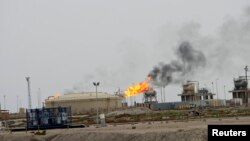Iraq's oil exports from its southern terminals are holding close to a record high in October and Kurdish shipments are climbing, a further sign that fighting has not derailed an expansion of supplies from OPEC's second-largest producer.
Four months after an advance by the Islamic State group into northern Iraq sent oil prices soaring to $115 a barrel, the unrest has not led to a reduction in Iraq's exports from the south, the main outlet for its crude to world markets.
Exports from Iraq's southern terminals have averaged 2.55 million barrels per day (bpd), according to shipping data for the first 23 days of October tracked by Reuters. An industry source who monitors the exports had a similar estimate.
The increase in supplies from Iraq, as well as a recovery in Libyan production despite conflict there, adds to the challenge for the Organization of the Petroleum Exporting Countries, which meets to review supply policy on Nov. 27.
Oil has fallen steeply from June's high to a four-year low of $82.60 a barrel this month on ample supplies, reducing OPEC members' income from their principal export.
“So far no country has said it is willing to cut,” said Carsten Fritsch, analyst at Commerzbank in Frankfurt. “So it will be difficult for OPEC to find an agreement overall.”
The export figure has been achieved despite some delays to shipments and loadings caused by bad weather, making the achievement all the more impressive, oil industry sources said.
Southern Iraqi exports so far in October are slightly up from the average of 2.54 million bpd during all of September and are within sight of May's average of 2.58 million bpd, which was the highest since at least 2003.
Iraq's oil supplies were held back by decades of war and sanctions. It has been expanding oil production in the south since Western companies signed a series of service contracts with Baghdad in 2010, and boosted export capacity.
Total exports from Iraq's northern and southern ports hit a record 2.8-million bpd in February. But northern exports of Kirkuk crude have been shut since March 2 due to attacks on a pipeline to Turkey, keeping total exports below their potential.
While Kirkuk exports remain halted and are unlikely to return soon, Iraq's Kurdistan region has been exporting a rising amount of oil independently of Baghdad via Turkey's Ceyhan port.
These averaged 180,000 bpd in September, according to the International Energy Agency, and may have reached 200,000 bpd in October, an industry source who tracks the shipments said.
Further, small volumes of Iraqi oil are being sold by Islamic State militants, which seized some oilfields in northern Iraq in June with output of around 28,000 bpd.
Including oilfields it controls in Syria, the militant group was producing about 50,000 to 60,000 bpd before recent U.S.-led air strikes, research firm IHS estimated this week.
The trade is worth about $2 million a day, IHS said, as the oil is sold on the black market at steep discounts to world prices, ranging between $25 to $60 a barrel.





